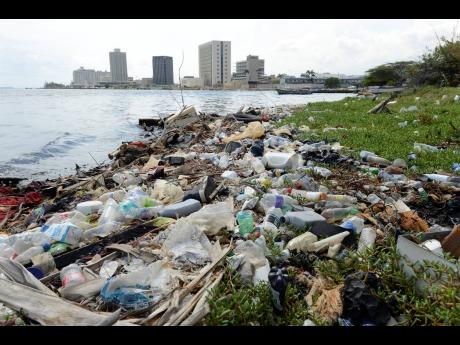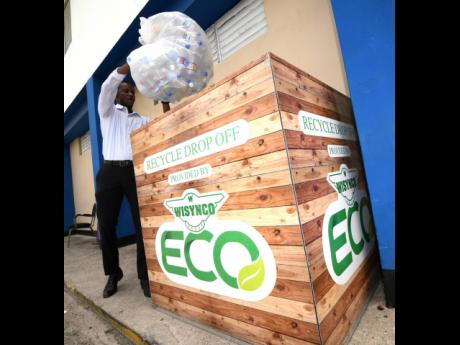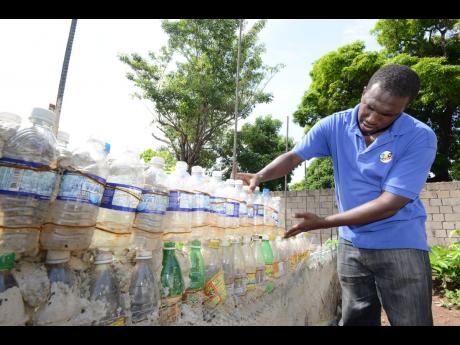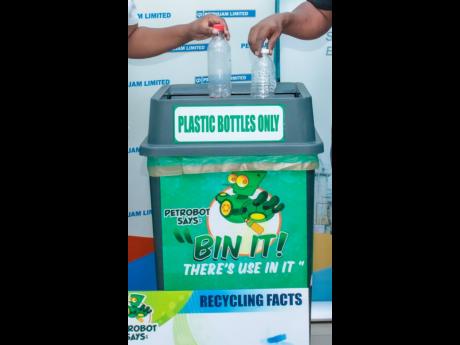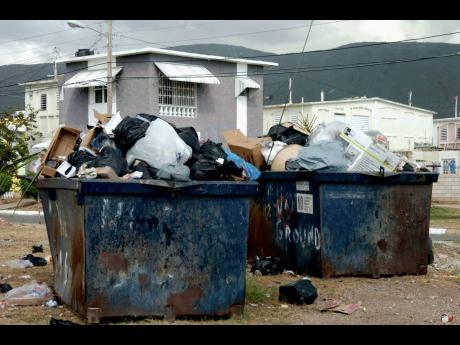Recycling dilemma
Stakeholders say cultural shift necessary for proper waste disposal to protect environment
In many developed nations, such as Germany and South Korea, recycling bins for separating plastic, paper, cans and glass are easily accessible to citizens walking along roadways for convenient disposal and easy collection. However, many developing...
In many developed nations, such as Germany and South Korea, recycling bins for separating plastic, paper, cans and glass are easily accessible to citizens walking along roadways for convenient disposal and easy collection.
However, many developing states, like Jamaica, have struggled to manage increasing amounts of solid waste, and not many people are willing to adopt a culture of recycling into their daily lives.
According to environmental scientist Raymond Pryce, there needs to be a major shift in how many Jamaicans perceive waste management.
Pryce told The Sunday Gleaner that currently, many individuals fail to recognise the value in food and beverage packaging, as the initial course of action is to throw it away.
He argued that to ensure a more sustainable society, Jamaicans need to adopt a “modern world” mindset of following the concepts of reuse, reduce and recycle, as too frequently, citizens feel at ease with tossing trash out the windows of moving vehicles and on to sidewalks and roadways, while also filling the drains and gullies with waste.
It is anticipated that the installation of recycling bins across the island could make a significant difference in reducing plastic pollution, which not only endangers the ecosystem through the emission of the greenhouse gases from its decomposition, but also threatens marine life once it enters the ocean.
“When I go in the coastal zones, you would be surprised of the different kinds of items that you see as part of the waste which end up on our coral reefs, or in our mangrove forests,” Pryce said, noting that sometimes when necropsies are done on animals like turtles, various types of plastics are found within the stomach which they consumed in the ocean.
“I’ve seen the crocodiles washed up dead and when you investigate, you see plastics in the stomach of the crocodile as well,” he added.
SYSTEM TO CATEGORISE TRASH
The environmental scientist explained that Jamaica could put in place a system of categorising trash like other countries and craft policies that encourage the collection and retrieval of household and kitchen waste, which can be used to make compost that will aid in agriculture.
He pointed out that the National Solid Waste Management Authority (NSWMA) can help in this regard to ensure that recycled items are used as raw materials to create by-products.
There is a belief that rewarding citizens for recycling has great potential for success and Pryce concurs. He noted that an incentived programme to encourage the disposal of waste appropriately would be a great move.
But he expressed worry of an “an unfortunate reality” that a project roll-out of this kind could be faced with acts of vandalism and theft of the receptacles by Jamaicans.
“I remember being a part of a programme some years ago and when the containers were put down, after a while, they were stolen and reconditioned for jerk pans,” Pryce told The Sunday Gleaner.
Therefore, multifaceted public education campaigns are necessary, he said, that must include the purpose of the programme and must also be intentional about the prosecution of offenders.
TOO MANY STILL BELIEVE IN THE ‘DUTTY MENTALITY’
While some Seaview Gardens residents in St Andrew are dedicated to keeping their environment clean by collecting plastics, according to Donna Thomas, operator of the recycle/redemption centre Cash Fi Plastic Bottle outlet, there are still far too many residents who “just believe inna [the] dutty mentality”.
In an interview with The Sunday Gleaner last week, Thomas, whose outlet has been endorsed by the Recycling Partners of Jamaica (RPJ) and Jamaica Recycles, bemoaned that some people still prefer to throw plastic bottles in the trash or nearby gully or even burn them.
This, despite her efforts to broadcast the news about recycling throughout the community, as well as taking to the streets to hand out flyers and business cards.
“Some people cooperate enuh, because you’ll never go to some of them rubbish pan and see a plastic bottle, but others just don’t care. Dem a say, ‘What is one or two bottle to throw away?’” she said.
The recycling advocate accepts all types of plastics at her outlet, as she displayed 20-, 25-, 45- and 100-pound bags, as well as various bottles such as detergent, cooking oil and motor oil – which fall in the polyethylene terephthalate (PET) and high-density polyethylene (HDPE) categories.
Plastic items are bought for $22 per pound, which is weighed on an industrial scale, she said, stressing that persons can easily make a decent amount of money from it.
“Imagine if a person carry like six bags of plastic, they can get like $13,200. Persons glad because at the end of the day nuh body nah tek up that and give you,” she said.
Thomas spoke to success stories coming from people within the Seaview Gardens community who have diligently collected and sold plastics, as one lady, she said, was able to build a community shop from her earnings.
“The time the young boy dem tek a walk a beg, dem coulda do this ... and me open any time ... If we get everybody on board, we naffi a clean drain and the gully so often,” she noted.
‘EIGHT OUT OF EVERY 10 WILL TRY’
Meanwhile, several residents of Glen Drive in Cassava Piece, St Andrew, who spoke to The Sunday Gleaner last week, said while they were open to the idea of recycling, there needs to be more public receptacles.
Some said they would only support it if they were compensated, while others said they recycled without the expectation of receiving money.
“A whole heap a time me see people pick up plastic bottles, y’know, and give them away to places like the shop people dem weh sell detergent,” said a female resident, adding that throwing away plastic bottles was not a good practice because “they have use”.
“Better you give them away than throw them away,” she added.
“To me, if you talk to people and tell dem say dem a guh get money for it, because a money dem a deal with, more likely them will try save the bottle dem. Eight out of every 10 will try,” a male resident reasoned.
The locals blame infrequent garbage collection on the waste disposal dilemma, which they claim force some residents to either use the nearby gully as a dump or to travel far distances to other communities where the garbage truck visits to dispose of their waste.
With their community suffering from constant mosquito breeding as well as rat and roach infestations, last week the Cassava Piece residents said garbage trucks have not been seen in their area for quite some time, but they were unable to say when was the last time their waste was collected.
TREAT INCENTIVISATION MORE SERIOUSLY
Rohan Brown, managing director of Jamaica Recycles, expressed disappointment to The Sunday Gleaner about the volume of plastic bottles that are still contaminating the environment, despite the different private sector solutions available to assist in its reduction.
According to Brown, there would be significantly fewer plastic bottles polluting the environment if the recycling incentivisation was treated more seriously.
He said the current incentive system which offers $1 per bottle, equating to $22 per pound of plastic material, was not attractive. This, he said, results in a collection of about 20 to 25 per cent of recyclable waste generated across the island.
“So, although many persons are aware that there is some value in it, it is insignificant,” Brown said, adding that he would want to see the incentive increased to at least $4 per plastic bottle.
He said while there remains significant potential for recycling in Jamaica, there needs to be better coordination and collaboration between Government and the private sector to create an effective framework.
VERY LITTLE PARTICIPATION OR INTEREST IN RECYCLING
“Generally, there is very little participation or interest in recycling. It is more of lip service than anything else, essentially from the top (the Government) to the bottom (the common man). Yes, you have pockets of institutions like the Jamaica Environment Trust (JET) that are specific in dealing with this area, but outside of that there is very little support,” he said.
Jamaica Recycle’s 2021 launch of community-based recycling programmes across Kingston and St Andrew have been “fairly successful”, said Brown. He explained that after visiting various communities and establishing a link with the households, the residents are paid when members of the team visit to collect the bottles.
Brown admitted that this model was costly for the company, which supplies residents with collection drums, but said it was promising and that the company was exploring ways to collaborate with other institutions to reduce costs while still generating results.
“When we go once a month to a community like Vineyard Town, we’re getting over 6,000 pounds (of plastic bottles). In Franklyn Town 7,000 pounds,” the recycling advocate revealed, noting that overall, the company collects an average of 800 to 900 metric tonnes of 40-foot containers of plastic material per month.
Jamaica Recycles also collects waste paper, cardboard and in some instances aluminium cans – which are retrieved for $20 per pound.
The recycling process includes baling, crushing and packaging the material in cubes, which are then exported to undergo the final steps.
“What we are hoping is to have a wider acceptance and a better system where the material doesn’t reach the dumps ... because when it reaches the dump, a lot of it is lost, maybe half of it is lost, and then the quality of it has deteriorated due to being contaminated or dirty,” Brown explained.
MORE BANS COMING
Since January 1, 2019, Jamaica has banned the importation, manufacture, distribution and use of single-use plastics, polystyrene foam products used in the food and beverage industry, and plastic drinking straws.
Senator Matthew Samuda, minister with responsibilities for water, the environment and climate change, indicated that the Government’s next step is to ban microbeads found in personal care items – they are frequently used in exfoliating products due to their ability to help remove dry, dead skin cells and help in unclogging pores.
Plastic lunch boxes are expected to be outlawed effective December 31, 2023, to encourage use of recycled, paper-based solutions.
Up to press time, the ministry had not responded to queries from The Sunday Gleaner regarding effective recycling and plastic waste management initiatives.
GREATER COMPLIANCE WITH CONTAINERISATION OF GARBAGE
Audley Gordon, executive director of the NSWMA, informed The Sunday Gleaner that there has been greater compliance with the containerisation of garbage, but the agency still had its work cut out in dealing with individuals littering public spaces.
Under the National Solid Waste Management Act 2001, a total of 3,137 tickets were issued for improper waste disposal over the last three years. Of that number, only 2,099 cases were brought before the courts.
Gordon said tickets issued to offenders typically range between 300 and 450 every month; however, 504 tickets issued in the month of July indicate a worrying increase.
To combat the practice of poor waste disposal, the NSWMA and its islandwide bodies have bolstered its capacity through the employment of 44 more enforcement officers, bringing the total to 60 members tasked with ensuring citizens’ compliance across the island. The officers are accompanied by an investigator.
Pursuant to Section 2 (2) of the National Solid Waste Management Act 2001, enforcement officers employ the methods of stake out, observation or surveillance to catch offenders.
If the fine is not paid by the stipulated date, an automatic summons is issued. And if the person fails to attend court on the date stated on the ticket, then a bench warrant is issued for their arrest.
Additionally, the NSWMA enforcement team collaborates with other parties to carry out its tasks, including the municipal police, public health officers, and officers designated with authority under the Natural Resources Conservation Authority (NRCA) Act or Regulations.
PUBLIC SKIPS ABUSED BY COMMERCIAL OPERATORS
Addressing the concern of limited public skips across the island, Gordon explained that the difficulty with placing more of the waste disposal units in main areas is that they are being abused by commercial operators who do not want to enter into a contractual agreement with NSWMA to dispose of their garbage.
“Once a skip is placed in a public area, it automatically invites people to dump garbage, including business operators who use it to dispose of their waste, including bulky waste. And these skips also pose a challenge for persons who use the roadways as they must endure unsightly pile-up garbage,” he explained.
The NSWMA boss stated that the entity will continue its public awareness campaign on proper waste disposal. And this includes recycling, as well as disposal of electronic waste such as mobile phones, computer parts and laptops, televisions, video game consoles, small and large household appliances, and office items such as computers, monitors, copiers and scanners.
LITTERING HOTSPOTS
The NSWMA has deemed 12 out of Jamaica’s 14 parishes as hotspots for littering.
These locations are:
1. Kingston and St Andrew – Downtown, Cross Roads, Half-Way Tree and Papine’s market district.
2. St Catherine – Naggo Head, Municipal Boulevard, Lakes Pen, Linstead and Spanish Town’s commercial district.
3. St Thomas – Yallahs, and Poorman’s Corner.
4. Clarendon – May Pen town centre.
5. Manchester – Leaders Plaza (behind the arcade), Mandeville town, Patrick Road and Nashville bus park.
6. St Elizabeth – Santa Plaza and Beatles Plaza.
7. Westmoreland – Great Georges Street and Negril to West End.
8. St James – Montego Bay commercial district.
9. Trelawny – Falmouth town.
10. St Ann – Ocho Rios commercial district and St Ann’s Bay.
11. St Mary – Port Maria town centre and Oracabessa.
12. Portland – Port Antonio and Buff Bay.

